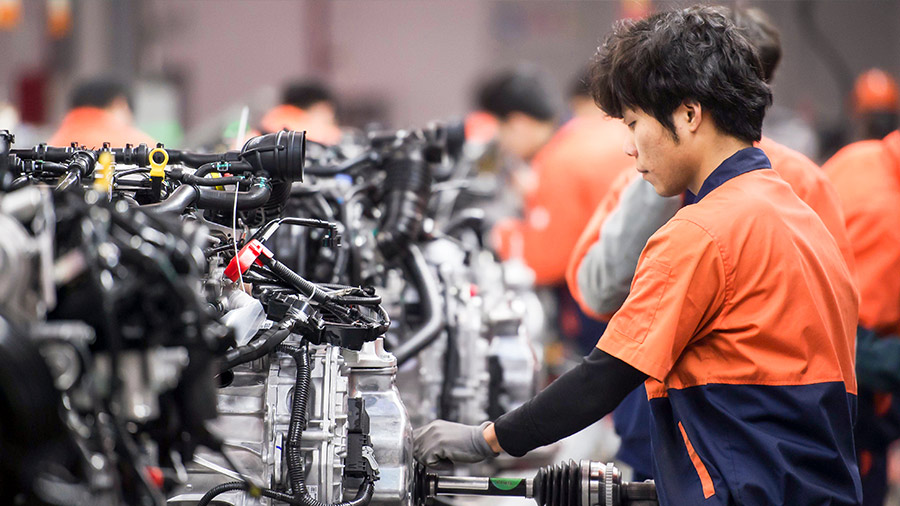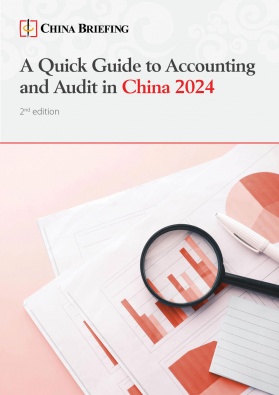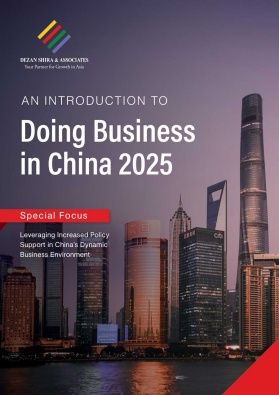China-Germany Bilateral Direct Investment: Trends and Outlook
Direct investment between China and Germany declined in 2023, due to a range of factors from global economic uncertainty to policy changes. However, China remains an important destination for German foreign direct investment (FDI), and key industries in both countries continue to excite investors. We look at the latest direct investment data between Germany and China to analyze the latest trends and discuss key factors that could shape future business and commercial ties.
Direct investment between China and Germany has undergone profound changes over the past decade. An increasingly complex investment environment for companies in both countries has led to falling two-way FDI figures in the first three quarters of 2023, in stark contrast to positive trends seen in 2022.
At the same time, industries with high growth potential, such as automotive and advanced manufacturing, continue to attract German companies to China, and high levels of reinvested earnings suggest established firms are doubling down on their commitments in the Chinese market. In Germany, the potential for electric vehicle (EV) sales is buoying otherwise low investment among Chinese companies.
In this article, we analyze the latest data on direct investment between China and Germany and discuss the economic and political factors driving the recent trends.
German investment in China
According to data from Deutsche Bundesbank, Germany’s central bank, total FDI outflows from Germany to China fell in the first three quarters of 2023, declining by 30 percent to a total of EUR 7.98 billion.
This is a marked reversal of trends from 2022, when FDI flows from Germany to China reached a record EUR 11.4 billion, up 14.7 percent year-on-year.
However, according to China’s Ministry of Commerce (MOFCOM), the actual use of foreign capital from Germany to China increased by 21 percent year-on-year in the first eight months of 2023. The Deutsche Bundesbank’s FDI data, which follows standards set by the IMF, the OECD, and the European Central Bank (ECB), includes a broader scope of transactions within its direct investment data, including, broadly, direct investment positions, direct investment income flows, and direct investment financial flows.
Meanwhile, the actual use of foreign capital recorded by MOFCOM includes contracted foreign capital that has been concluded, including the registered and working capital paid by foreign investors, as well as the transaction consideration paid for the transferred equity of domestic investors.
Deutsche Bundesbank data shows net investments from Germany to China (including direct investment, portfolio investment, financial derivatives and employee stock options, and other investments) remaining almost completely level in the first three quarters of 2023 compared to the same period in 2022.
The majority of German direct investment into China in 2022 and 2023 was in the form of reinvested earnings on equity and investment fund shares. Between the first and third quarters of 2023, total reinvested earnings by German companies exceeded overall FDI inflows, reaching EUR 9.7 billion. This phenomenon was also seen in 2022 when reinvested earnings reached a total of EUR 12.4 billion.
The high share of reinvested earnings indicates further consolidation of German investment in China between a few large established companies. This trend can be traced back over a decade; in 2022, research by the US think tank Rhodium Group found that just four German companies Volkswagen, BMW, Daimler, and BASF accounted for “34 percent of all European FDI into China by value from 2018 to 2021”.
The decline in German FDI into China must be considered against the broader decline in FDI inflows into China and FDI outflows from Germany in 2023. That year, the actual use of foreign capital in China declined by 8 percent year-on-year to RMB 1.13 trillion (approximately EUR 146.2 billion), per data from the Chinese Ministry of Commerce (MOFCOM).
German companies, grappling with an economic recession at home, have also scaled down investments in 2023 more generally. According to a report from the German Economic Institue (IW) cited by Reuters, German companies’ overall FDI outflows dropped from EUR 104 billion in the first half of 2022 to just EUR 63 billion in 2023. In its Special Report of the DIHK Economic Survey published in February 2023, the German Chamber of Commerce and Industry (DIHK) found that German industrial companies had the lowest share of foreign investment recorded in 14 years, with the “energy price crisis and the slowdown in the global economy” cited as core reasons for this.
Another reason for this change may be the drastic drop in investment guarantees provided to German companies following the introduction of new caps on the size of guarantees that can be given to investors in a single country. As a result, only EUR 51.9 million in investment guarantees were issued by the German government to companies investing in China between January and August 2023, down from EUR 745.9 million issued over the whole of 2022, according to reporting from Reuters.
German companies as a whole may continue to invest less in China in 2024. Companies surveyed in the ifo Business Survey published in November 2023 reported that they will decrease investments in 2024 in general, while the German Chamber of Commerce’s 2023/2024 Business Confidence Survey found that only 54 percent of surveyed companies planned to invest in China within the next two years, compared to 67 percent in 2019.
Although German companies appear to be tightening their belts, the overall size of Germany’s investment in China cannot be understated. The share of German FDI in China increased from 11.6 percent in 2022 to 16.4 percent in the first half of 2023, according to the IW report. In 2019, China’s share of German FDI was only 5.1 percent. This trend indicates that China is an ever more important destination for German direct investment.
Moreover, German companies with an existing presence in China remain committed to the country. The German Chamber’s Business Confidence Survey found that 91 percent of companies were committed to the Chinese market, an increase of 2 percent compared to last year. The main reason for the continued belief in the Chinese market cited was “the need to remain competitive”, with 79 percent of companies naming this as their primary reason to invest in China. Meanwhile, 37 percent stated that China’s innovation potential was a major draw. Finally, German companies overwhelmingly have faith in the long-term health of China’s economy, with 90 percent stating they believe its economy will recover in five years.
Auto manufacturing continues to attract German investors
Despite increasing competition from domestic players, China remains an incredibly important market for German carmakers. In 2023, BMW Group’s sales of BMW and MINI models in China accounted for 32.3 percent of total units sold worldwide. For Mercedes Benz, China sales accounted for 29.6 percent of the total. The sales in China of both companies recovered significantly in 2023 following a slump in 2022.
Large German automakers are also doubling down on their commitments to the Chinese market in 2023, with optimism toward the EV industry in particular fueling investment.
Faced with fierce competition from domestic players in the EV space, German automakers are increasingly looking to establish Sino-foreign joint ventures to expand their market presence.
In May 2023, BMW Brilliance Automotive (BBA), a joint venture between BMW and the Chinese automaker Brilliant Auto, announced that its new line of NEUE KLASSE EV models, which will start production in 2025, will also be produced by BBA through a new location in Shenyang starting in 2026. To achieve this, BBA will invest RMB 10 billion (approximately EUR 1.3 billion) in the new location, which will also produce battery cells.
In July 2023, Volkswagen (VW) Group took steps to expand its footprint in the EV market, striking two new deals with domestic EV makers. This included an investment of around US$700 million in EV manufacturer XPENG in the form of a capital increase, which will see VW Group hold about 4.99 percent of XPENG shares. In addition, VW-owned Audi signed a strategic memorandum to expand cooperation with its joint venture partner SAIC Motor to “extend the portfolio of fully connected electric vehicles on offer in the premium segment”.
Further, in November 2023, Mercedes Benz and BMW Group reached an agreement to establish a joint venture to build a high-power charging network across China, aiming to build a network of at least 1,000 high-power charging stations with around 7,000 high-power charging piles by the end of 2026.
Audi is reportedly also considering a deal with Huawei to develop autonomous driving for Audi vehicles sold in China and built through its joint venture with FAW Group, a Chinese automaker.
German advanced manufacturing moving to China
Another industry that continues to attract investment from German companies is China’s advanced manufacturing sector. Advanced manufacturing, or high-tech manufacturing, is a broad category of sectors, including manufacturing of pharmaceuticals, aviation, spacecraft, and related equipment, electronic and communication equipment, computer and office equipment, medical equipment and instrumentation, and “information chemicals” (such as photosensitive materials and chemical preparations for movies, photography, healthcare, slide shows, and projections).
China’s advanced manufacturing industry is fast catching up with some of the most developed countries in the world. According to the International Trade Organization, China ranks eighth in the world in terms of robot density, with 276 robots utilized per 10,000 workers. China recently surpassed the US, in ninth place, but is still behind Germany in fourth place. Both Germany and China rank in the top three countries for the most amount of service robot suppliers, just behind the US at number one.
China’s advanced manufacturing industry is one of the few industries that saw an increase in the actual use of foreign capital in 2023, according to data from MOFCOM. Last year, foreign capital in advanced manufacturing grew 6.5 percent year-on-year, defying the 1.8 percent deceleration recorded in the overall manufacturing industry. Among the best-performing sectors were medical equipment and instrumentation manufacturing and electronics and communication equipment manufacturing, which saw year-on-year increases in foreign capital of 32.1 percent and 12.2 percent, respectively.
Although Germany’s domestic advanced manufacturing industry remains dominant on the world stage, German companies are increasingly expanding their presence in China. Lured by the considerable market and innovation potential, lower operational costs, and deep integration with China’s mature supply chains, 2023 saw German companies make several new investment commitments in the China market.
For instance, in June 2023, Siemens announced an expansion of its digital factory in Chengdu, committing to a further investment of EUR 140 million. In 2022, Siemens also announced it was investing in a new digital R&D innovation center in Shenzhen “to speed up development of motion control systems with digitalization and power electronics technology”.
Also in June that year, the German chemicals and consumer goods company Henkel broke ground on a new “smart factory” in Shandong province, which is to increase the production capacity of its high-impact adhesive products in China. Henkel will invest EUR 120 million in the facility.
Chinese investment in Germany
Chinese investment in Germany dropped drastically in the first three quarters of 2023. According to data from Deutsche Bundesbank, EUR 2.3 billion of direct Chinese investment exited the market, a decrease of 233 percent year-on-year from a positive flow of EUR 3.7 billion in 2022.
FDI flows from China to Europe have been on the decline in recent years. In 2022, according to a joint report from MERICS and Rhodium Group, Chinese FDI in Europe dropped to just EUR 7.9 billion, down 22 percent compared to 2021. This puts Chinese FDI in Europe at the same level as in 2013.
Increased scrutiny over Chinese investment deals in Europe, in particular in sensitive industries such as semiconductors, is a major reason for the decline in Chinese M&As, according to the report. Several attempted deals between European and Chinese companies have been blocked, including in Germany, the UK, Denmark, and Italy. This in turn has fueled Chinese greenfield investments, which in 2022 grew by 53 percent year-on-year and exceeded M&A investments for the first time since 2008.
It is also worth noting that FDI in Germany in general declined in 2022, with around EUR 125 billion more direct investment flowing out of Germany than flowed in, according to IW. This was due to factors such as a shortage of skilled workers, competition from other countries (notably the US), and the overall decline of the fossil fuel auto industry.
However, Europe remains a key market for Chinese EV companies’ overseas expansion, in particular EV battery production. Europe is the second largest market for EVs in the world after China, according to the MERICS and Rhodium Report, and Chinese companies are looking to expand their presence by investing in upstream and downstream segments of the value chain, primarily through greenfield investment.
Currently, Chinese companies’ presence in Germany’s EV industry is dominated by battery manufacturing. In September 2023, Chinese electric vehicle battery maker Gotion High-Tech announced it had begun construction of a battery plant in Gottingen, Germany, its first plant in Europe. Chinese battery manufacturer CATL officially began production in its first plant outside of China, in Arnstadt, Germany in December 2022.
EV manufacturer XPeng announced in September 2023 that it will begin expanding into Germany, the UK, and France in 2024. Meanwhile, Chinese EV companies are exploring the possibility of producing cars in Germany, with Chinese EV manufacturer Great Wall Motors reportedly considering Germany as the location for a new production plant in Europe.
China’s efforts to attract FDI in the face of EU “de-risking”
The Chinese government has been actively seeking to attract foreign capital since reopening, with high-level officials highlighting the important role foreign companies will play in China’s post-pandemic recovery. In order to combat the low FDI recorded in 2023, the government has ramped up efforts to attract foreign direct investment in China by optimizing the business environment for foreign companies and investors.
In August, China’s State Council released a comprehensive set of guidelines providing clear directives to local governments to tackle some of these challenges. The document, titled The Opinions of the State Council on Further Optimizing the Foreign Investment Environment and Intensifying Efforts to Attract Foreign Investment (the “Opinions”), contains 24 suggestions for attracting foreign investments, ranging from improving intellectual property rights to facilitating cross-border data flows.
The Opinions spurred cautious optimism among foreign business organizations in China, with the EU Chamber of Commerce in China stating that they “could go a long way to improving business confidence if they are implemented in a timely, coordinated and consistent manner”.
Some local governments also followed suit – in April and May of this year, Shanghai released measures aiming to attract foreign investment and improve the business environment in the city.
While the Chinese government is keen on attracting more foreign capital, Germany – and the EU more broadly – has been seeking to reduce its reliance on China. In June 2023, the European Council (EC) issued an official decision on its China strategy, which reiterated its goal to “de-risk” rather than “decouple” from the Chinese economy. Broadly, the strategy involves reducing the bloc’s dependence on China for critical materials and commodities.
Following this, the German government released its own China strategy document, which largely echoes the stance taken by the EC. On de-risking, the document states that “a reduction of risks is urgently required” but that “we reject a decoupling of our national economies.”
One of the main mechanisms for “de-risking” in the EC decision includes reducing “strategic dependencies” in “sensitive areas”, such as critical raw materials, semiconductors, health, digital technologies, and food. In the China context, de-risking will therefore mean reducing the EU’s dependency on Chinese imports in these areas; however, EU investments in Chinese industries, and vice versa, may also come under increased scrutiny as a result.
It is also important to note the tension between the EU and Germany’s de-risking strategies, and their ambitions to decarbonize the economy. In a speech given at the WEF, EC President Ursula von der Leyen noted that Europe is 98 percent dependent on China for certain rare earths required for the manufacturing of technology for wind power generation, hydrogen storage, and batteries.
Moreover, in the wake of heightened gas prices as a result of the Russia-Ukraine war, decarbonization is increasingly a security issue for Germany and the EU. The EU’s Versailles Declaration outlines the need for the EU to reduce its energy dependencies, which will require reducing the reliance on fossil fuels and “speeding up the development of renewables and the production of their key components”.
This puts the tension between the EU’s need to collaborate with China on green technology and its desire to reduce its dependency on Chinese imports for key materials into sharp focus.
The impact that the de-risking strategy will have on mutual investment between China and Germany is not yet clear, given the variety of factors impacting the investment environment. As it stands, mutual investment in 2024 is likely to be characterized by further consolidation between a few large companies, both in China and Germany, as well as continued investment in strategic and high-growth sectors.
About Us
China Briefing is written and produced by Dezan Shira & Associates. The practice assists foreign investors into China and has done so since 1992 through offices in Beijing, Tianjin, Dalian, Qingdao, Shanghai, Hangzhou, Ningbo, Suzhou, Guangzhou, Dongguan, Zhongshan, Shenzhen, and Hong Kong. Please contact the firm for assistance in China at china@dezshira.com.
Dezan Shira & Associates has offices in Vietnam, Indonesia, Singapore, United States, Germany, Italy, India, and Dubai (UAE). We also have partner firms assisting foreign investors in The Philippines, Malaysia, Thailand, and Bangladesh.
- Previous Article 2024 Aranceles de importación y exportación en China
- Next Article German Chamber’s Business Confidence Survey 2023/24: Key Findings

























